#there's a fun meta to it
Text
if they ever make an spn reboot i just think. Well, I think Jensen Ackles should play John.
#vinny types#the brainworms it would create would be so interesting#the 'is john a good dad' discourse would be UNBEARABLE#and i just think it would be fun to see#also like. okay there's something fun abt it. Dean hates himself bc he hates his dad but loves his dad and would do anything for his dad#FatherGod and all that#but also its you#in every sense of the word Dean's his own worst enemy#there's a fun meta to it#smth smth living up to the expectations of those who came before you vs killing those expectations to be your authentic self#altho knowing jackles and the rest of the crew were this to happen they probably WOULD take away a lot of the nuance and make John a better#person AND feature him a lot more in the show#neither of which I want
4 notes
·
View notes
Text
I see a lot of people clowning on the people of Pelican Town for not repairing the community center themselves or clowning on Lewis for embezzling and. like. Those criticisms aren't entirely unfair. But I think instead of coming at it from a perspective of "why can't the townspeople do this" we should be asking "why and how can the farmer do this?"
Like. Think about it. The farmer arrives in Stardew Valley on the first day of spring. By the first day they're obviously different. By day five the spirits of the forest who haven't been seen by the townsfolk in years or generations are speaking to them. By the second week they've developed a rapport with the wizard that lives outside town.
In the spring they go foraging and find more than even Linus, who's spent so many years learning the ways of the valley. Maybe he knows, when he sees them walking back home. Maybe he looks at them and understands that they're different, chosen somehow.
In the summer they fish in the lakes and the ocean for hours on end, catching fish that even Willy's only ever heard of, fish that he thought were the stuff of legend. They pull up giants from the deep and mutated monstrosities from the sewers.
In the fall, their crops grow incredibly immense; pumpkins twice as tall as a person, big enough that someone could live inside. The farmer cuts it down with an axe without even batting an eye. Does Lewis wonder, when he checks the collection bin that night and finds it full to the brim with pumpkin flesh? What does he think? Does he even leave the money? Does he have the funds to pay the farmer millions of dollars for the massive amounts of wine they sell? Or is it someone--something--else entirely?
In the winter, the farmer delves into the mines. No one in Pelican Town has been down there in decades. No one in living memory has been to the bottom. The farmer gets there within the season. They return to the surface with stories of dwarven ruins and shadow people, stories they only tell to Vincent and Jas, whose retellings will be dismissed by the adults as flights of fancy. People walking by the entrance to the mines sometimes hear the farmer in there, speaking in a language no one can understand. Something speaks back.
The farmer speaks to the the wizard. They speak to the spirit of a bear inside a centuries-old stone. They speak to the shadow people and the dwarves, ancient enemies, and they try to mend the rift. They speak to the Junimos, ancient spirits of the forest and the river and the mountain. They taste the nectar of the stardrops and speak to the valley itself. They change Pelican Town, and they change the valley. Things are waking up.
And what does Evelyn think? She's the oldest person in the valley; she was here when the farmer's grandfather was young. (How old *is* she, anyway? She never seems to age. She doesn't remember the year she was born.) Does she see the farmer and think of their grandfather? Does she try to remember if he was like this too, strange and wild and given the gifts of the forest?
And does their grandfather haunt the valley? He haunts the farm, still there even after his death; his body died somewhere else, but his spirit could never stay away for long. Does Abigail, using her ouija board on a stormy night, almost drop the planchette when she realizes it's moving on its own? Does Shane, walking to work long before anyone else leaves their house, catch glimpses of a wispy figure floating through the town? Does the farmer know their grandfather came back to the place they both love so much?
Mr. Qi takes interest in the farmer. He's different, too; in a different way, maybe, but the principles are the same. They're both exceptional, and no matter what Qi says about it being hard work and dedication, they both know the truth: the world bends around the both of them, changing to fit their needs. Most people aren't visited by fairies or witches. Most people don't have meteorites crash in their yard. Most people couldn't chop down trees all day without a break or speak to bears and mice and frogs.
The farmer is different. The rules of the world don't work for them the way they work for everyone else. The farmer goes fishing and finds the stuff of fairy tales. The farmer goes mining and fights shadow beasts and flying snakes. The farmer looks at paths the townspeople walk every day and finds buried in the dirt relics of lost civilizations.
The farmer is a violent, irrepressible miracle, chosen by the valley and destined to return to it someday. Even if they'd never received the letter, they would've come home.
They always come home eventually.
#lich says shit#stardew valley#sorry for the stardew valley meta i'm just so obsessed with how FREAKY the farmer is. Like it's so fun#gonna write another long ass post about the farmer's bloodline specifically and. like.#why did their grandpa leave the valley?? why did their parents never go back??#stardew valley farmer#sdv
3K notes
·
View notes
Text
3K notes
·
View notes
Text
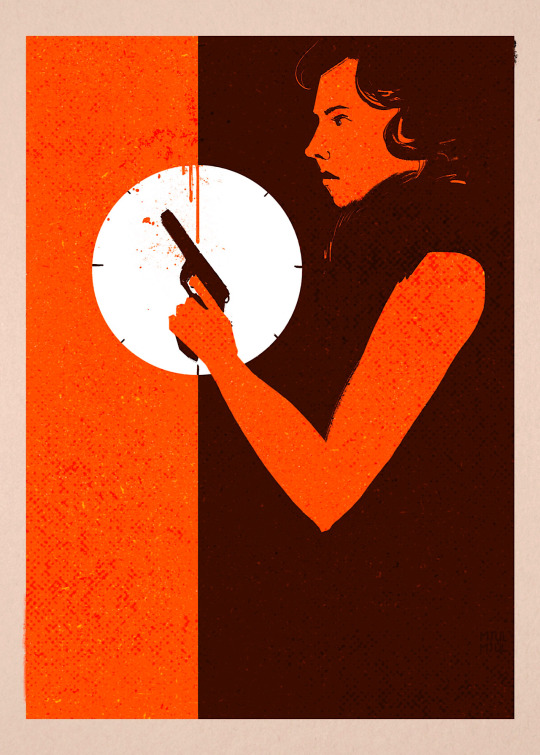
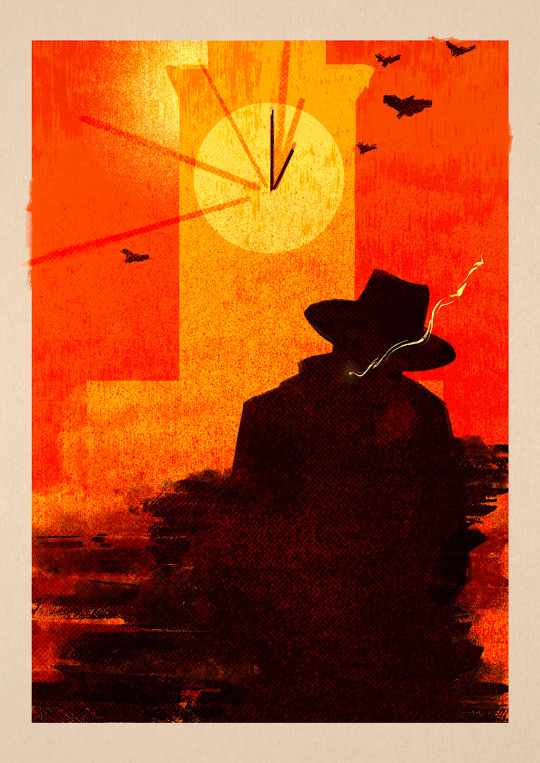
Katya / Goncharov
#yeah ik ive posted them before sorry but i REALLY like how these look together#martin scorsese#goncharov#artists on tumblr#illustration#unreality#<— posters for a ‘movie’ that doesn’t actually exist but is a tumblr meme in which everyone pretends it does&makes content for it#fascinating how we’re immediately personable w katya by knowing her first name while only knowing goncharov’s surname keeps us at a distanc#combined with him being the only major character to go by a moniker it emphasizes just how much he's been consumed by the role he plays#who is goncharov? does he know and keep it secret? or has he too lost his sense of identity?#it's reflected in these posters as we SEE katya but goncharov remains elusive - yet clearly time is running out for them both#lakjdklf ok im done now i never post meta on here so im having fun with the fictional movie#btw I updated both of the illustrations compared to the original posts but will leave those as they were#woudl be cool if my post showed up. u can do it tumblr
21K notes
·
View notes
Text


dr simptio
anyways isnt aventurines boss form wife material
#AUGHHHH its so SO PEAK HES SO GENDER#what right does this man have to go into everyones lives and snatch their gender#omg imagine a boss form for topaz tho PLEASE FATHER HOYO I'D DO ANYTHING INCLUDING SELLING MY KIDNEY FOR THAT#also the triple fua dps team is genuinely so fun ik i could replace clara with rm/ting but WHO CARES ABOUT META#aventurine#aventio#aventurine honkai star rail#hsr#hsr fanart#honkai star rail#star rail#penacony#hsr penacony#dr ratio#ratiorine#hsr topaz#hsr aventurine
1K notes
·
View notes
Text

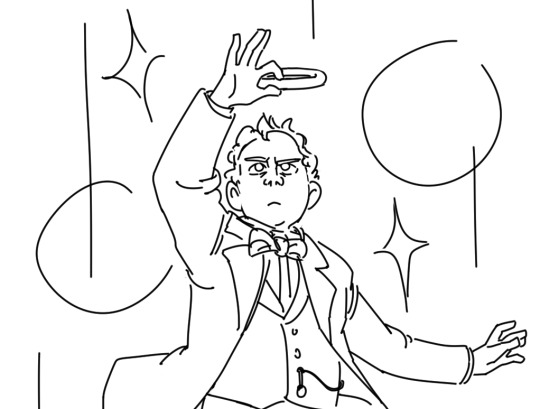


actual scene as it happened in the show
#gos2spoilers#spoilers#good omens#good omens spoilers#hopefully i tagged enough for blacklists#ransart#everyone is typing up beautiful meta analyses and painting beautiful art and i'm here like...#thinking non stop about this part LOL#i just love it; how many does he have? how long is the cooldown period for this 9th level cleric spell#no want sad; only fun
6K notes
·
View notes
Text
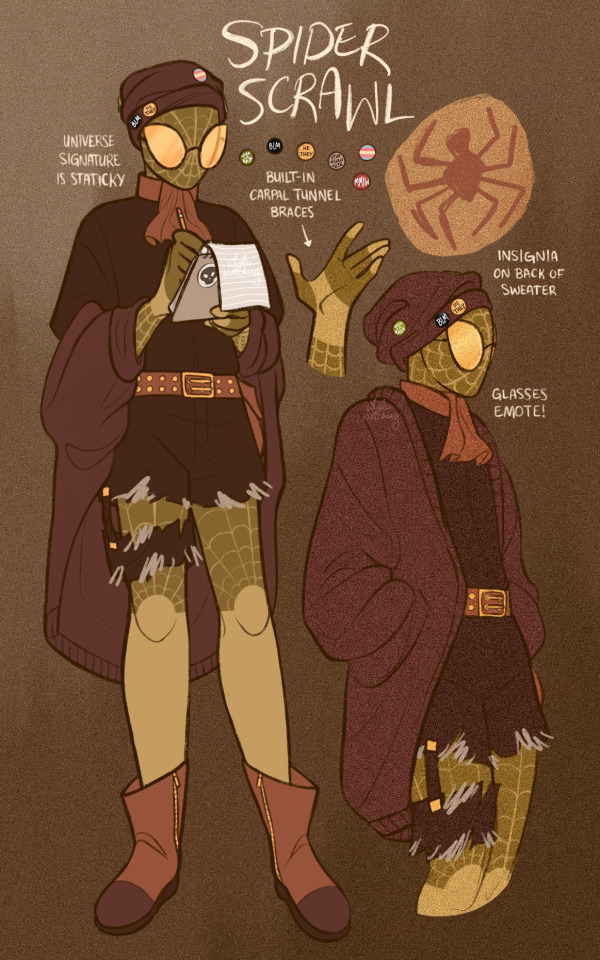

diagnoses u with fanfic tags
yeah i caved. welcome spideysona
their universe is 1990s san francisco. by day they work as a struggling writer for the bugle, sort of following in the footsteps of (movie-adjacent) eddie brock; by night they’re spider-scrawl, fighting systemic injustice, writers’ block, and the occasional mad scientist invention. his world is less rife with supernatural evils than most, but he’s also fucking with the government and corporations and all, so it balances out
their unique thing is that they have, like, shitty meta clairvoyance in the form of inherently understanding tropes, clichés, story structure, etc. like if cinemasins/wins were a superhero. they were approached to join the society because miguel thought they’d be chill or even helpful with canon events—unfortunately scribble here is not whatsoever into following rigid plot structure for the sake of unnecessary thematic suffering, saw the plot twist a miles away, and peaced. but not before snagging a day pass so they could watch atsv in person
they never take off their mask, and no one knows their name—he says it’s because he doesn’t want to lose his identity in a sea of spider-people, leading most to theorize that san-fran-spidey is some flavor of peter parker, but who’s to say for sure? the doylist reason, which he is in fact aware of, is that i don’t know either lol
#spider man: across the spiderverse#spidersona#spider scrawl#spider punk#spider noir#hobie brown#noirpunk#just a tad ;)#brass tacks means facts!#haha do you get it miles like a mile away but miles was the one wh—#so anyway sona shit#eddie in their universe has left the bugle for better things (read: got fired movie style)#still a bangin journalist tho and scrawl aspires to be like him#their deadpool is just as meta as them. they’re buddies#usually i’m not one for sonas but this was fun#static and colors inspired by that can u ever forgive me movie from 2018#scrawl puts on the mask to feel more confident about fighting the system#hopin & prayin it’ll do the same for me :’)
5K notes
·
View notes
Text
Hey y'all! Since it's Love Loses Wednesday for all who celebrate and I have plenty of thoughts about it, here's some of those thoughts I've had for my fellow enjoyers of Chip Bastard from the insanely powerful podcast Just Roll With It!
So.
Chip being so focused on family and friends, on finding Arlin and keeping his co-captains and crew safe, while the most he ever shows interest in romance is in brief, jokey flirting that's quickly brushed aside.
Chip buying a love potion, only for it to sit unused in his inventory for literal months until it unceremoniously drops into the mouth of the Electrodon.
Chip being unnerved or even downright scared when somebody shows a sign of being attracted to him (Amanda with the marriage, Jazz and his flirting, the frantic denial to Ollie that Gillion kissing him meant anything (which was then followed by barely any change in their relationship. A typically romantic act, done as an act of love between friends, and yet those friends never did start a romance. Curious))
Speaking of Amanda and the marriage: Chip waking up one day and suddenly being expected, even morally obligated, to be in a romantic relationship with somebody he doesn't even know, for reasons he doesn't even know. And even when he clarifies that he doesn't want this, that he won't give up being a pirate with his friends for it, he still can't leave behind the expectation fully, because Amanda, and thus this expectation, is literally chasing him. Sometimes it even comes from his own friends, because no matter how much he would prefer to just Not Be Married, there's no way for him to get out of it, especially not ones Gillion would likely accept, and therefore the expectation that eventually, he'll be in a romance, is inescapable.
And even more interesting, he's not opposed to the idea of getting married in general. He wasn't wholly against the notion of marrying Igneous just for the AC boost it would give them. Clearly, the problem he had wasn't with the marriage itself, but with the fact that he was expected to form a romantic partnership.
And lastly: Chip having his literal heart ripped out of him, and staying nearly the same. Making jokes about how his heart was stolen in a way that was literal instead of romantic. Writing to his wife that if death do them part, then now it has (and doesn't it even say something that the only way for him to escape the marriage, the expectations, was to die?)
He cares for his friends just the same. He cares for his crew just the same. He wants to find Arlin just as much as ever. And his avoidance of his wife, of the expectation that he perform romance, stays the same. But even if he's the exact same, he has an excuse for this now. Because clearly, somebody with no heart couldn't feel romance, and who cares that he didn't really seem to before he lost his heart either?
Chip being aromantic, on a textual, metaphorical, and thematic level.
#rem's ramblings#just roll with it riptide#jrwi riptide#chip bastard#chip jrwi#jrwi chip#riptide meta#riptide analysis#aromantic chip#aromantic headcanons#aromantic#amanda as a metaphor for amatonormativity in particular is So important to me#anyways yeah this is half textual evidence and half metaphors but Analysis Fun and either way. chip aromantic. i'm claiming him
1K notes
·
View notes
Text
So I accidentally almost got into an argument on Twitter, and now I'm thinking about bad historical costuming tropes. Specifically, Action Hero Leather Pants.
See, I was light-heartedly pointing out the inaccuracies of the costumes in Black Sails, and someone came out of the woodwork to defend the show. The misunderstanding was that they thought I was dismissing the show just for its costumes, which I wasn't - I was simply pointing out that it can't entirely care about material history (meaning specifically physical objects/culture) if it treats its clothes like that.
But this person was slightly offended on behalf of their show - especially, quote, "And from a fan of OFMD, no less!" Which got me thinking - it's true! I can abide a lot more historical costuming inaccuracy from Our Flag than I can Black Sails or Vikings. And I don't think it's just because one has my blorbos in it. But really, when it comes down to it...
What is the difference between this and this?
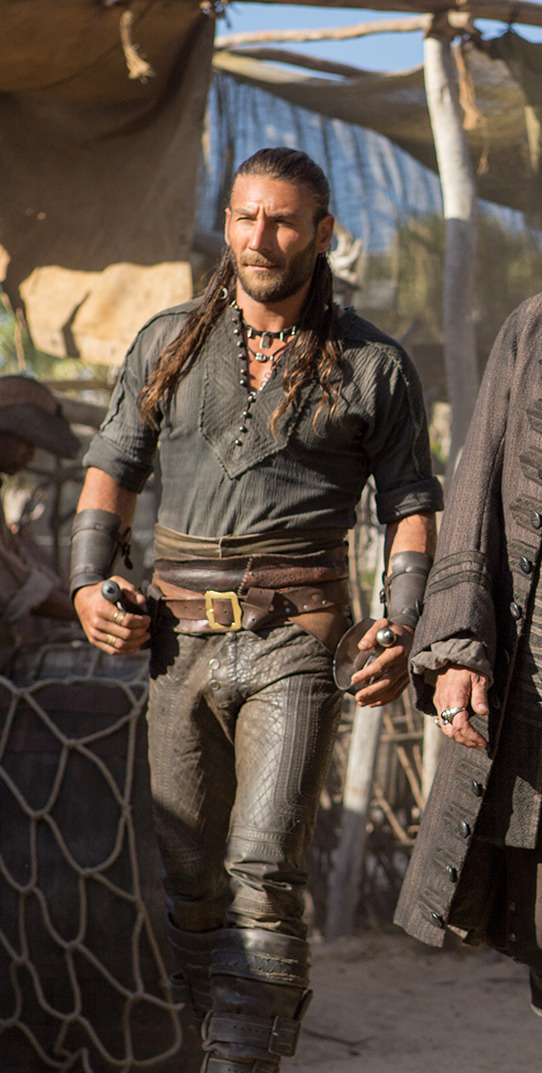
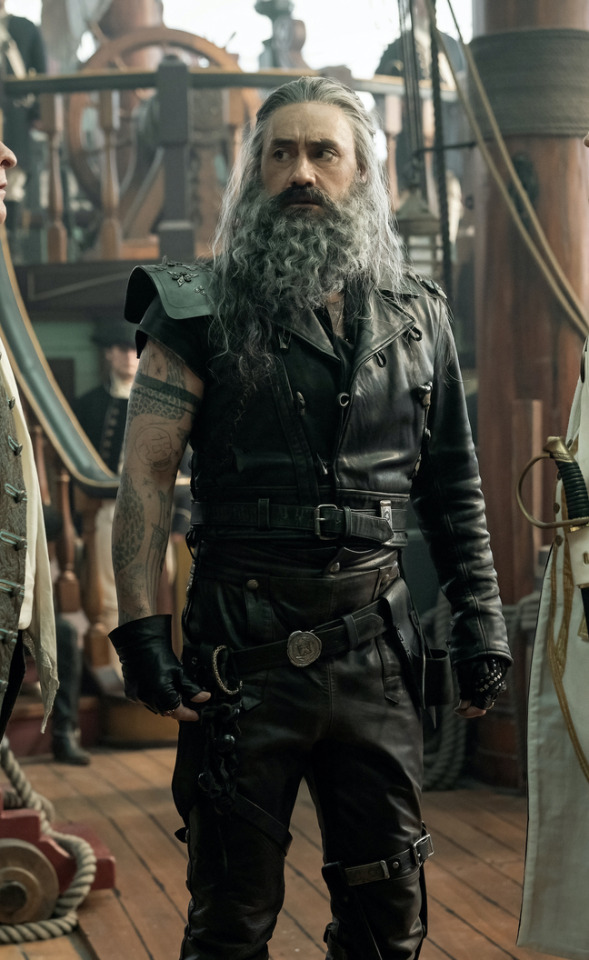
Here's the thing. Leather pants in period dramas isn't new. You've got your Vikings, Tudors, Outlander, Pirates of the Caribbean, Once Upon a Time, Will, The Musketeers, even Shakespeare in Love - they love to shove people in leather and call it a day. But where does this come from?
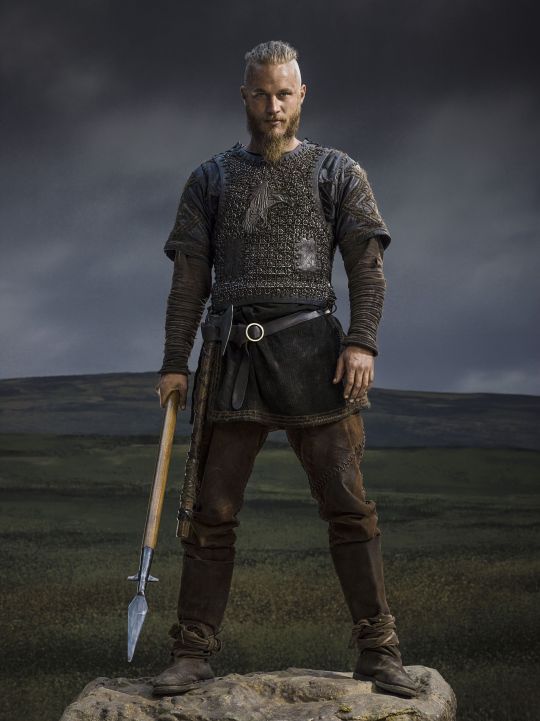
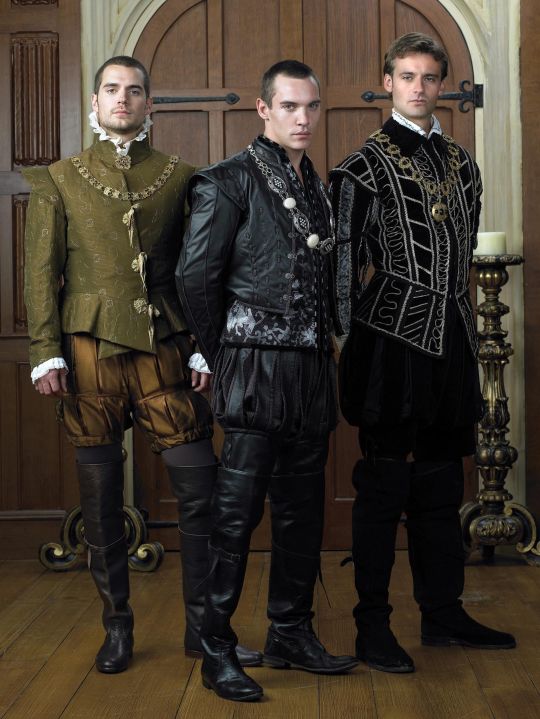
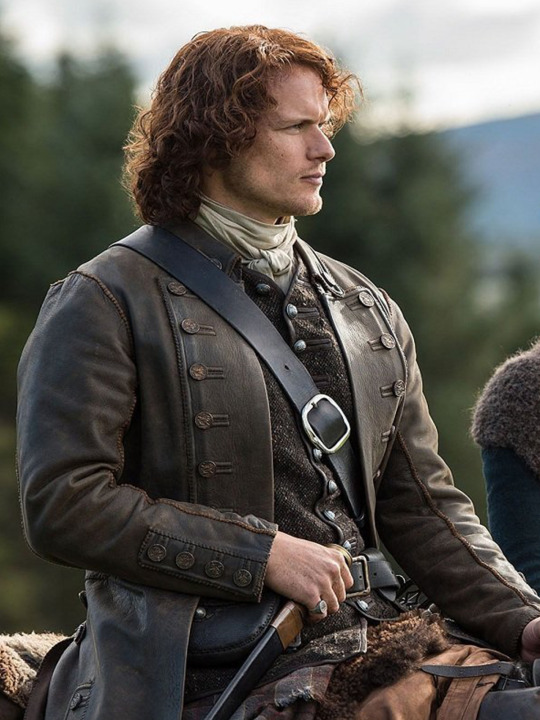

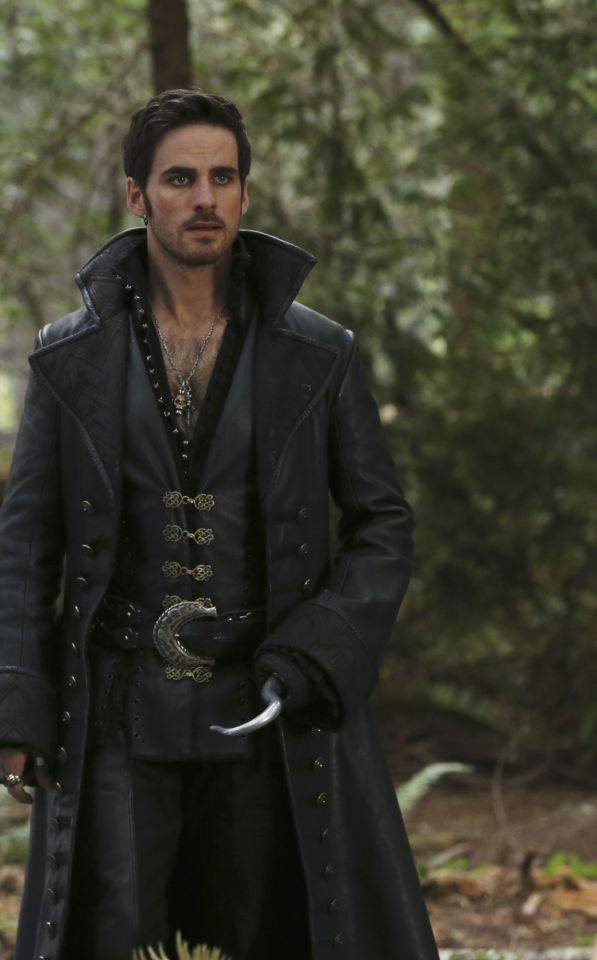
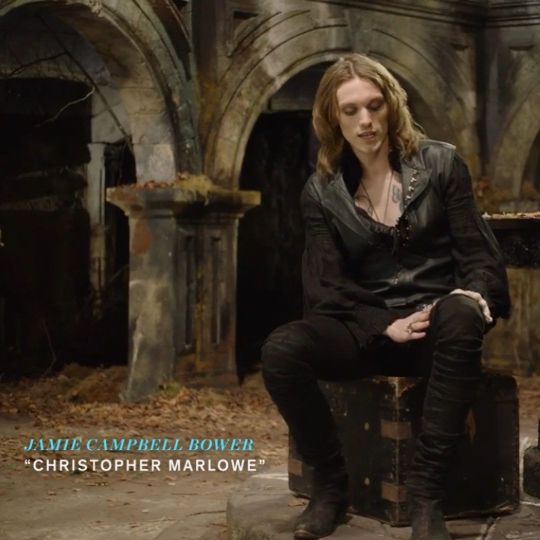
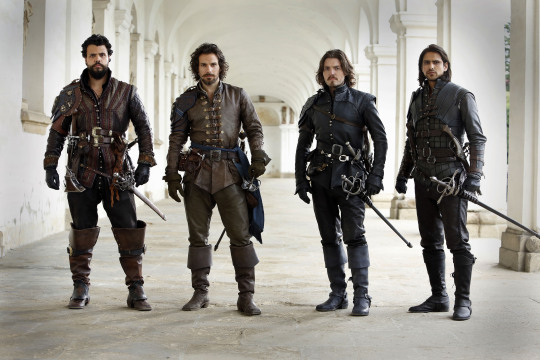
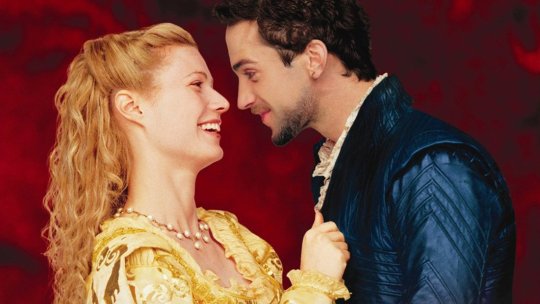
Obviously we have the modern connotations. Modern leather clothes developed in a few subcultures: cowboys drew on Native American clothing. (Allegedly. This is a little beyond my purview, I haven't seen any solid evidence, and it sounds like the kind of fact that people repeat a lot but is based on an assumption. I wouldn't know, though.) Leather was used in some WWI and II uniforms.
But the big boom came in the mid-C20th in motorcycle, punk/goth, and gay subcultures, all intertwined with each other and the above. Motorcyclists wear leather as practical protective gear, and it gets picked up by rock and punk artists as a symbol of counterculture, and transferred to movie designs. It gets wrapped up in gay and kink communities, with even more countercultural and taboo meanings. By the late C20th, leather has entered mainstream fashion, but it still carries those references to goths, punks, BDSM, and motorbike gangs, to James Dean, Marlon Brando, and Mick Jagger. This is whence we get our Spikes and Dave Listers in 1980s/90s media, bad boys and working-class punks.
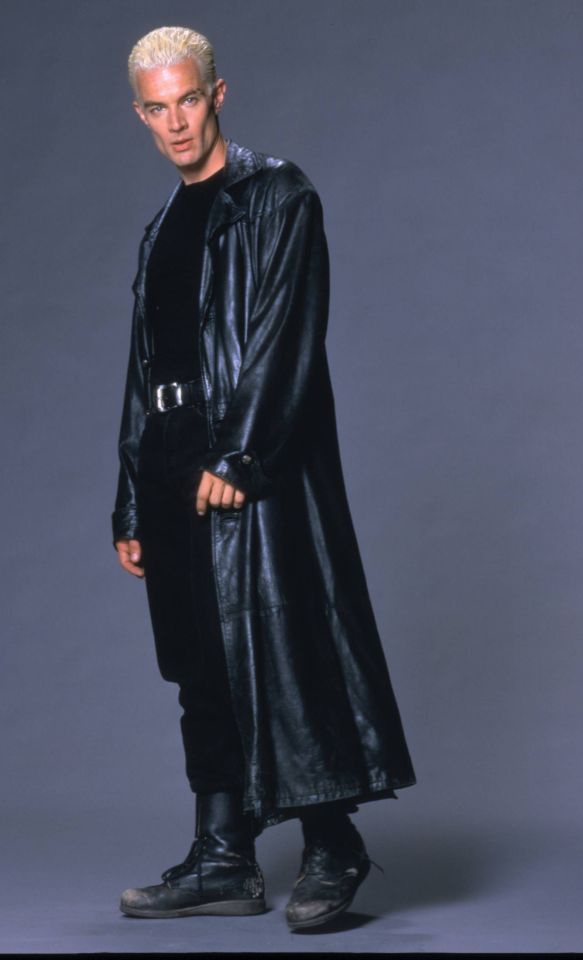
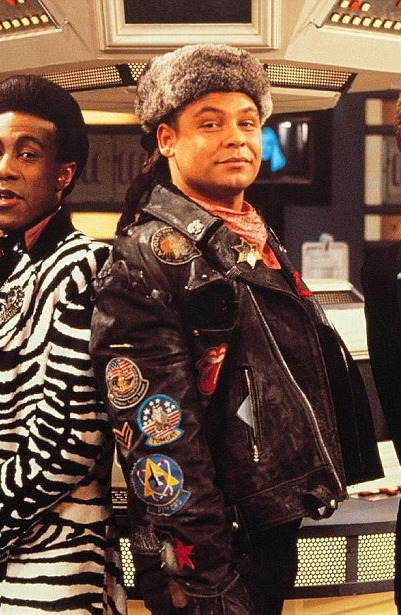
And some of the above "historical" design choices clearly build on these meanings. William Shakespeare is dressed in a black leather doublet to evoke the swaggering bad boy artist heartthrob, probably down on his luck. So is Kit Marlowe.
But the associations get a little fuzzier after that. Hook, with his eyeliner and jewellery, sure. King Henry, yeah, I see it. It's hideously ahistorical, but sure. But what about Jamie and Will and Ragnar, in their browns and shabby, battle-ready chic? Well, here we get the other strain of Bad Period Drama Leather.
See, designers like to point to history, but it's just not true. Leather armour, especially in the western/European world, is very, very rare, and not just because it decays faster than metal. (Yes, even in ancient Greece/Rome, despite many articles claiming that as the start of the leather armour trend!) It simply wasn't used a lot, because it's frankly useless at defending the body compared to metal. Leather was used as a backing for some splint armour pieces, and for belts, sheathes, and buckles, but it simply wasn't worn like the costumes above. It's heavy, uncomfortable, and hard to repair - it's simply not practical for a garment when you have perfectly comfortable, insulating, and widely available linen, wool, and cotton!
As far as I can see, the real influence on leather in period dramas is fantasy. Fantasy media has proliferated the idea of leather armour as the lightweight choice for rangers, elves, and rogues, a natural, quiet, flexible material, less flashy or restrictive than metal. And it is cheaper for a costume department to make, and easier for an actor to wear on set. It's in Dungeons and Dragons and Lord of the Rings, King Arthur, Runescape, and World of Warcraft.
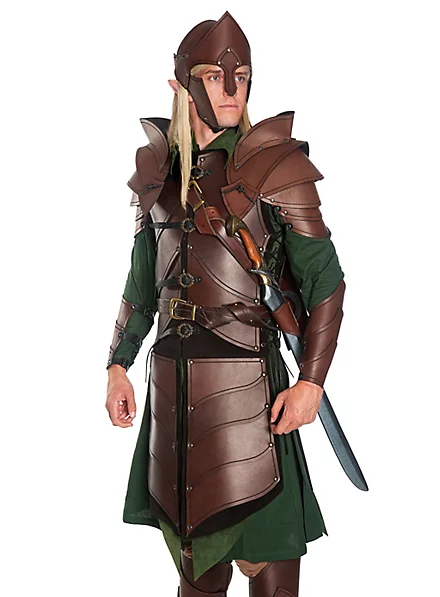
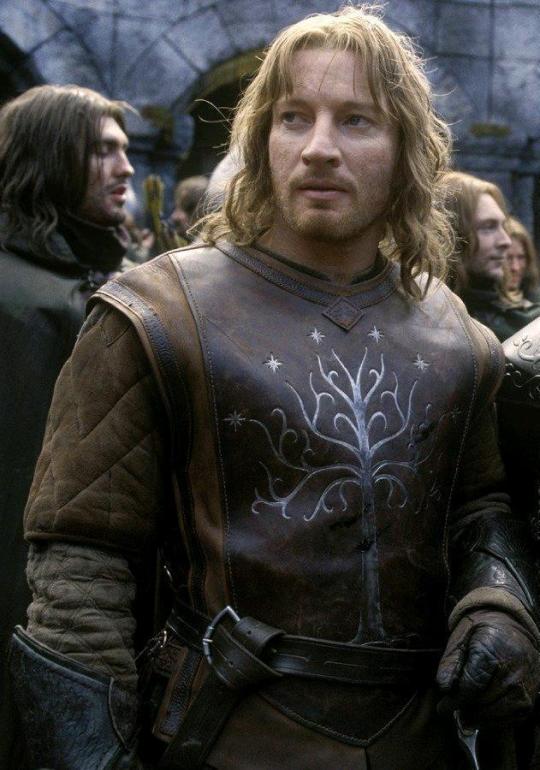
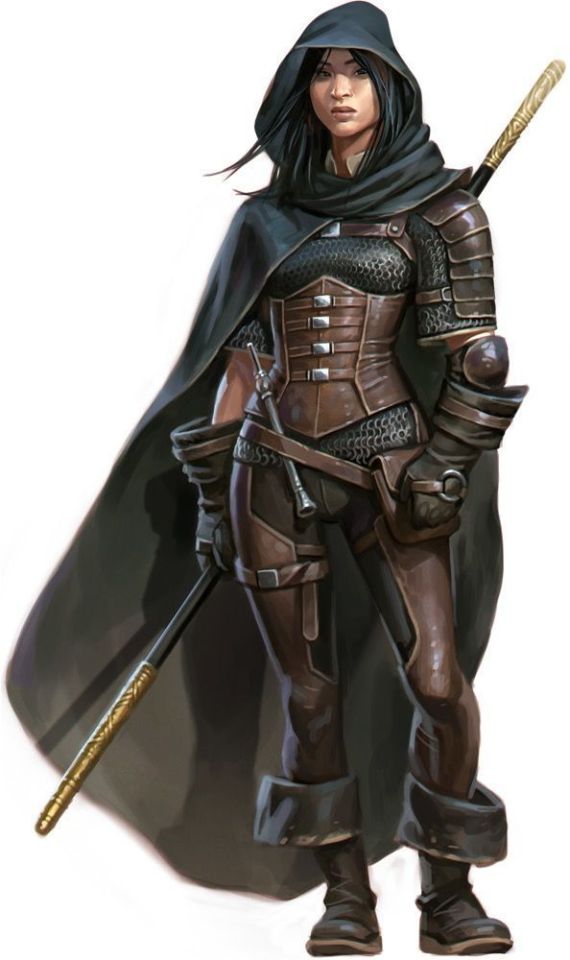
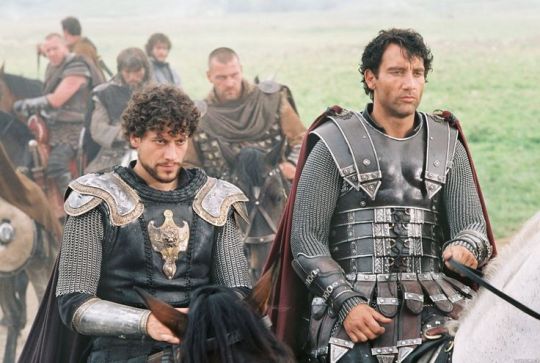

And I think this is how we get to characters like Ragnar and Vane. This idea of leather as practical gear and light armour, it's fantasy, but it has this lineage, behind which sits cowboy chaps and bomber/flight jackets. It's usually brown compared to the punk bad boy's black, less shiny, and more often piecemeal or decorated. In fact, there's a great distinction between the two Period Leather Modes within the same piece of media: Robin Hood (2006)! Compare the brooding, fascist-coded villain Guy of Gisborne with the shabby, bow-wielding, forest-dwelling Robin:
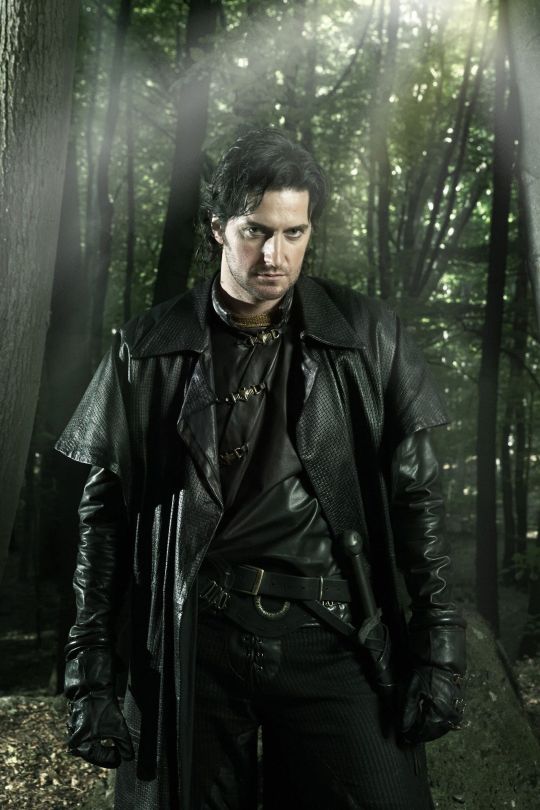
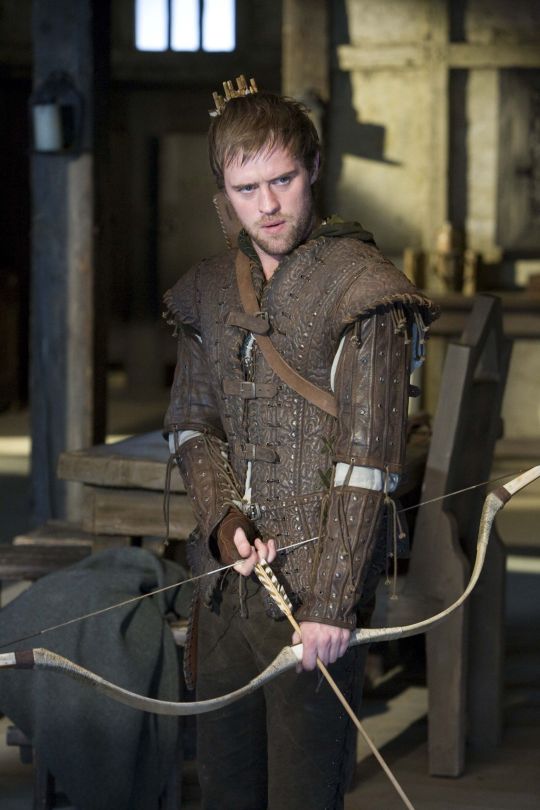
So, back to the original question: What's the difference between Charles Vane in Black Sails, and Edward Teach in Our Flag Means Death?
Simply put, it's intention. There is nothing intentional about Vane's leather in Black Sails. It's not the only leather in the show, and it only says what all shabby period leather says, relying on the same tropes as fantasy armour: he's a bad boy and a fighter in workaday leather, poor, flexible, and practical. None of these connotations are based in reality or history, and they've been done countless times before. It's boring design, neither historically accurate nor particularly creative, but much the same as all the other shabby chic fighters on our screens. He has a broad lineage in Lord of the Rings and Pirates of the Caribbean and such, but that's it.
In Our Flag, however, the lineage is much, much more intentional. Ed is a direct homage to Mad Max, the costuming in which is both practical (Max is an ex-cop and road warrior), and draws on punk and kink designs to evoke a counterculture gone mad to the point of social breakdown, exploiting the thrill of the taboo to frighten and titillate the audience.
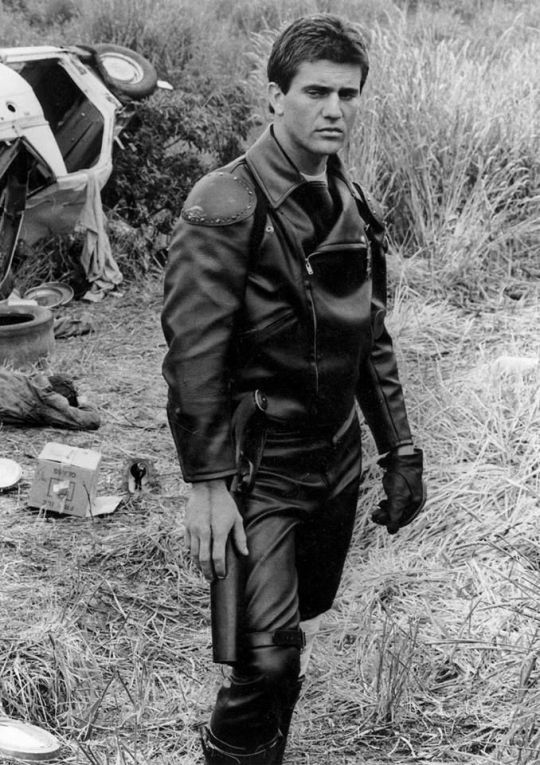
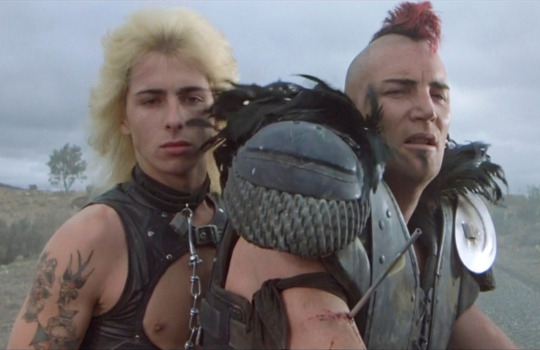
In particular, Ed is styled after Max in the second movie, having lost his family, been badly injured, and watched the world turn into an apocalypse. He's a broken man, withdrawn, violent, and deliberately cutting himself off from others to avoid getting hurt again. The plot of Mad Max 2 is him learning to open up and help others, making himself vulnerable to more loss, but more human in the process.
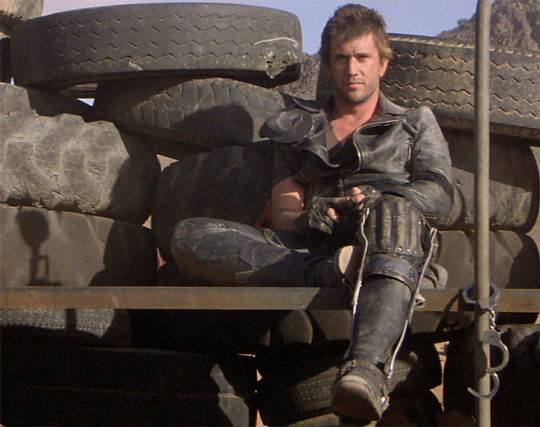
This ties directly into the themes of Our Flag - it's a deliberate intertext. Ed's emotional journey is also one from isolation and pain to vulnerability, community, and love. Mad Max (intentionally and unintentionally) explores themes of masculinity, violence, and power, while Max has become simplified in the popular imagination as a stoic, badass action hero rather than the more complex character he is, struggling with loss and humanity. Similarly, Our Flag explores masculinity, both textually (Stede is trying to build a less abusive pirate culture) and metatextually (the show champions complex, banal, and tender masculinities, especially when we're used to only seeing pirates in either gritty action movies or childish comedies).
Our Flag also draws on the specific countercultures of motorcycles, rockers, and gay/BDSM culture in its design and themes. Naturally, in such a queer show, one can't help but make the connection between leather pirates and leather daddies, and the design certainly nods at this, with its vests and studs. I always think about this guy, with his flat cap so reminiscient of gay leather fashions.
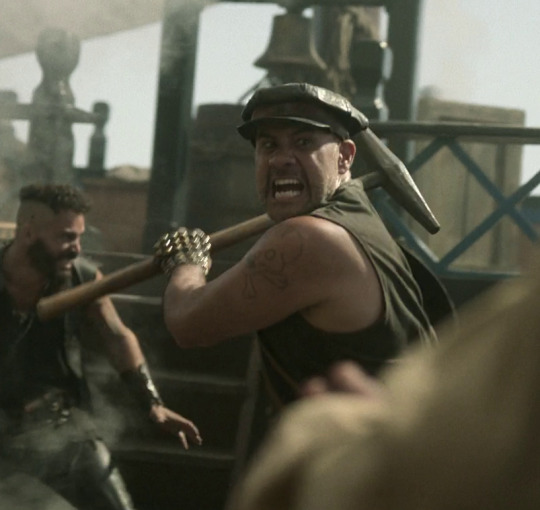
More overtly, though, Blackbeard and his crew are styled as both violent gangsters and countercultural rockstars. They rove the seas like a bikie gang, free and violent, and are seen as icons, bad boys and celebrities. Other pirates revere Blackbeard and wish they could be on his crew, while civilians are awed by his reputation, desperate for juicy, gory details.
This isn't all of why I like the costuming in Our Flag Means Death (especially season 1). Stede's outfits are by no means accurate, but they're a lot more accurate than most pirate media, and they're bright and colourful, with accurate and delightful silks, lace, velvets, and brocades, and lovely, puffy skirts on his jackets. Many of the Revenge crew wear recognisable sailor's trousers, and practical but bright, varied gear that easily conveys personality and flair. There is a surprising dedication to little details, like changing Ed's trousers to fall-fronts for a historical feel, Izzy's puffy sleeves, the handmade fringe on Lucius's red jacket, or the increasing absurdity of navy uniform cuffs between Nigel and Chauncey.
A really big one is the fact that they don't shy away from historical footwear! In almost every example above, we see the period drama's obsession with putting men in skinny jeans and bucket-top boots, but not only does Stede wear his little red-heeled shoes with stockings, but most of his crew, and the ordinary people of Barbados, wear low boots or pumps, and even rough, masculine characters like Pete wear knee breeches and bright colours. It's inaccurate, but at least it's a new kind of inaccuracy, that builds much more on actual historical fashions, and eschews the shortcuts of other, grittier period dramas in favour of colour and personality.
But also. At least it fucking says something with its leather.
#everyone say 'thank you togas' for not including a long tangent about evil rimmer in red dwarf 5x05#Our Flag Means Death#Togas does meta#and yes these principles DO fall apart slightly in s2 and i DON'T like those costumes as much#don't get me wrong they're fun and gorgeous - but generally a bit less deep and more inaccurate. so. :(#I'm not sure this really says anything new about Our Flag but I just needed to get my thoughts out#i hate hate hate Gritty Period Drama costumes they're so boring and so ugly and so wrong#god bless OFMD for using more than 3 muted colours and actually putting men in heels (and not as a shorthand for rich/foppish villainy) <3#looking at that Tudors still is insane like they really will go to any lengths to not make men feel like they've got bare legs XD#image descriptions in alt text#and yes i DID just sink about two hours into those so you'd better appreciate them
1K notes
·
View notes
Text
laios has very quickly become dear to me not just because he's an autistic protagonist but because his autism is itself one of the reasons his party has an edge over others. though we see him struggle in social situations, his special interest makes him hypercompetent in the context of dungeon survival. i'm aware that's not a NEW observation on him but i was impressed that he even used his special interest to successfully solve a crisis that relied on noticing social cues- he was able to pick out the impostors bc he honed in on the small discrepancies in their attitudes toward monsters. if that isn't weaponizing your autism, i don't know what is
#omg this keeps getting notes... u shld look at my reblog w additional ramblings/meta in it too 👉👈#dunmeshi#dungeon meshi#laios touden#laios#actuallyautistic#autism things#aphelion.txt#ALSO WHAT WAS WITH THAT RANDOM 5SEC ANIMATION THAT WAS JUST HIM STIMMING#WHAT WAS THAT HUH#hes like ok im shifting into barking mode. gotta hype myself up with a quick flap sesh. i love him wtf#but yeah. being in the exact situation that your neurodivergency makes you extremely well equipped for is like#any autistic person's power fantasy#dunmeshi is just so much fun
945 notes
·
View notes
Text
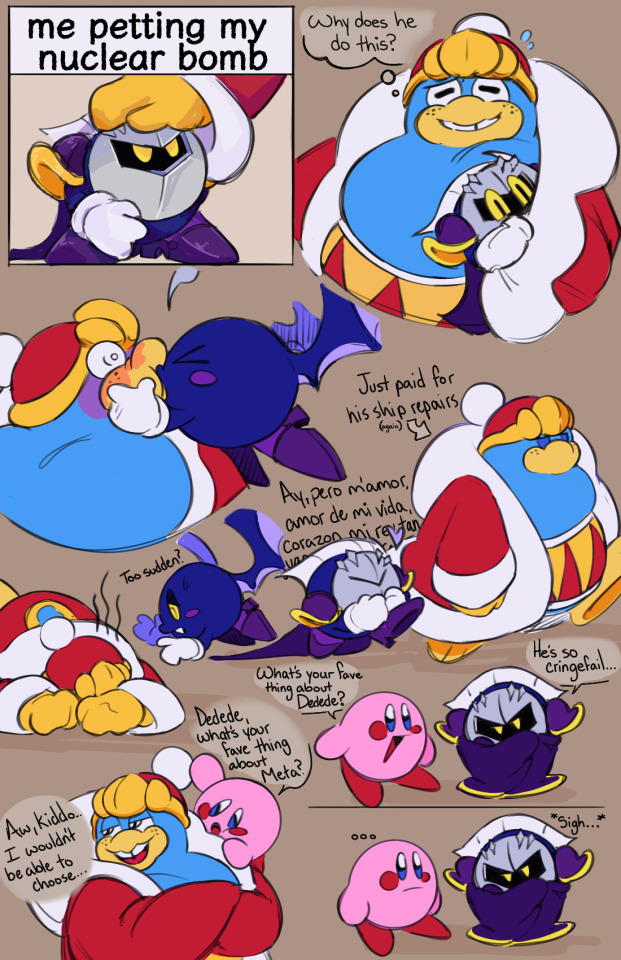
Told myself I'd post this eventually (it's been a month)
#oug ibispaint confuses me but I am going to be experimenting with it because it's fun nevertheless B))#I DRAW!!! WOAH!!#I swear I'll draw something else other than these two.. eventually#my art#kirby#meta knight#king dedede#metadede
1K notes
·
View notes
Note
whats so fun about the vaccinator (vacc slander)?
You come to my blog and disrespect me like that.

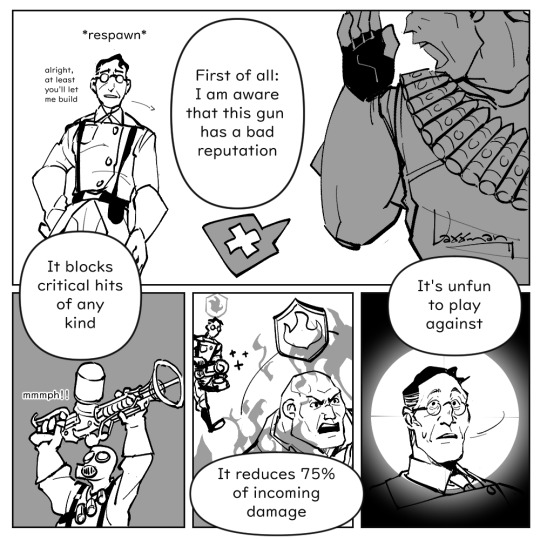
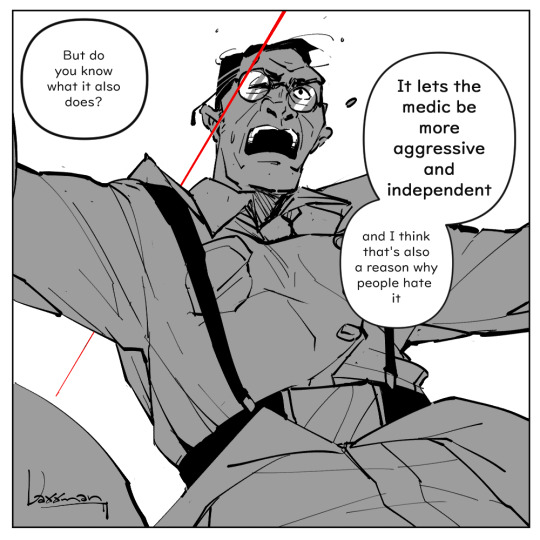
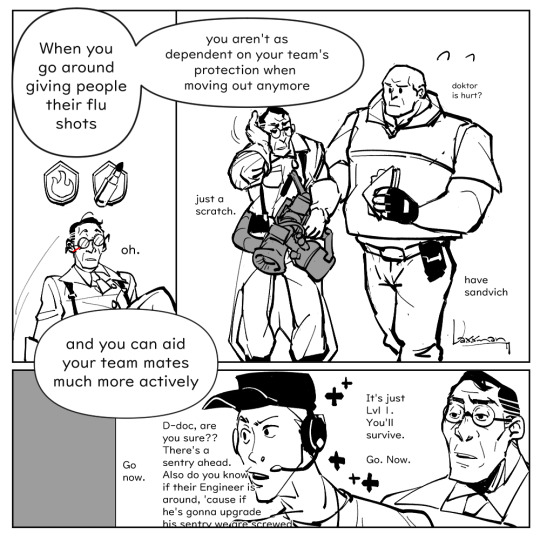

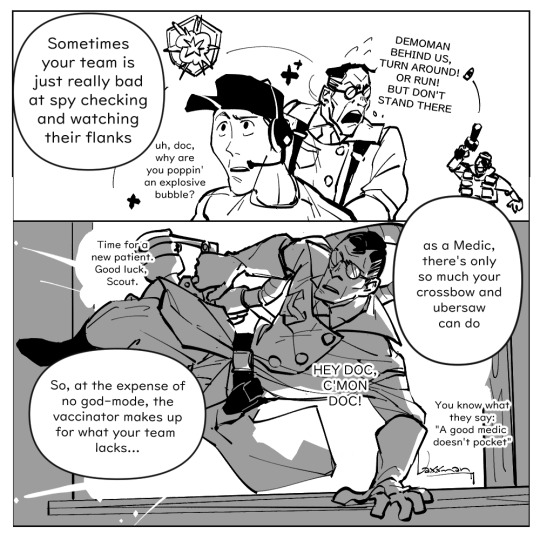

Have some vaccinator propaganda.
Some textless panels that I enjoyed drawing and rambling about the vaccinator medigun under the cut.
Surprise, it's only medic.
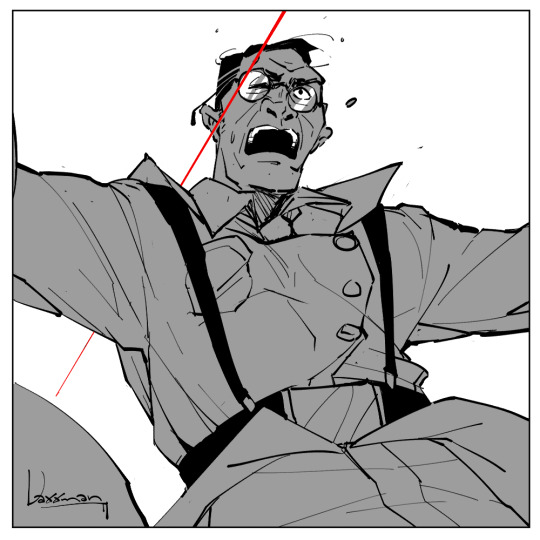
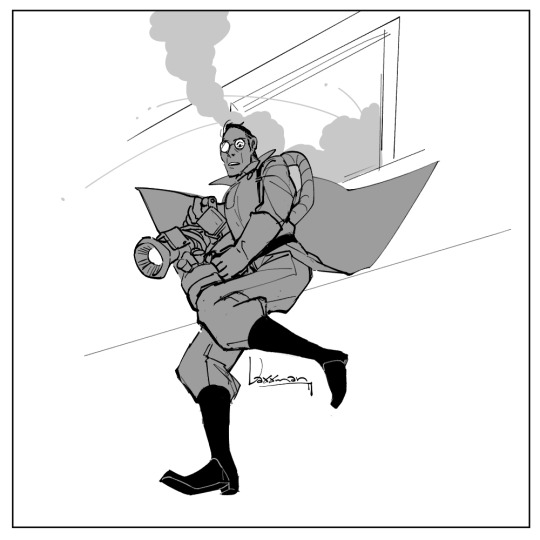

I am not saying the vaccinator is not absolutely broken, I 100% feel dirty using it against a badly coordinated team, hence I wouldn't mind if it received a nerf in the future.
A lot of people analyse the vaccinator as only useful against a badly coordinated enemy team, but I think it's much better as a weapon for when your own team sucks ass has bad synergy, since any form of uber is pretty much wasted on everyone (if you can even build enough charge). To compensate for everyone's mistakes, just make sure they stay alive long enough to capture points and push the cart. Everyone will automatically stay with you, and soon you'll have a nice meat shield of 4 people swarming around you. You know it's working, when there's suddenly 3 demoknights and a spy after you.
I love micromanaging my resistance bubbles, and I love micromanaging my team without them noticing that I'm doing it. Pressing the R-button to rotate through resistances feels like such a much more engaging contribution to the battles your patients are fighting.
Vaccinator is busted, but absolutely not boring.
And to close this rambling, here's my fav video about the vaccinator:
youtube
#team fortress 2#tf2#tf2 medic#tf2 heavy#tf2 scout#tf2 sniper#tf2 soldier#I would also like to place a disclaimer here: I am absolutely not good at this game#In no way is what this comic here shows meta knowledge#I just haven't seen a lot of people point out the positive sides of the vaccinator#which are: It's objectively the most engaging medigun and genuinely fun to use#People will complain about how playing medic is boring but the same people discourage the use of the vaccinator#If I see anyone try to spew hate about my opinion on this gun I'm blocking you fr
1K notes
·
View notes
Text
Grian had taken her aside quietly. He'd awkwardly talked around the idea of her remembering now; apparently, he didn't know if her victory counted. She'd rubbed the back of her head and hadn't quite realized what he was talking about and said something about the games and, ah. Apparently she does remember now. Apparently the victory counts. Apparently this means he needs to say sorry.
Cleo considers not accepting the apology. Grian would get the wrong idea then. If she said: you don't need to apologize for shit, or maybe, there's nothing to apologize for, he'd take that as: you are exactly as bad as you're convinced you are. Honestly, Cleo's not sure whether that means Grian would decide he'd done nothing wrong or everything, but that's besides the point.
She'd never not remembered, is the point.
Frankly, Cleo hadn't realized people were meant to be not remembering. She's honestly a bit embarrassed not to have figured it out. Surely that can't be right. Cleo has held every single slight and every single ally and every single person she has ever connected to right in her ribcage, next to where her carved-out, unbeating, torn-up heart lies, the entire time these games have gone on. Each game, a new fact carved into the bone that makes them up.
Names ribbon around her memories. Bdubs and the Crastle and Scott and soulmates and Pearl and friend-turned-foe and Etho and survivor and Bigb and traitor and Scar and son and everything else. She wouldn't be the same at all if she didn't remember. Everything she is, it's built on top of everyone that was.
Maybe it's a zombie thing. The undead are said to be memories that can't fade as much as anything else, after all.
But she can't really explain this to Grian, of course. If nothing else, that would require explaining the place he's taken next to her heart, too, and frankly, that's way too mushy for the both of them. What ends up coming out her mouth is: "Oh. Does that really change anything?"
Grian stares at her a moment.
"You know, I guess not?" he says.
"Right then," Cleo says. "Cool. Good to know my victory means nothing then."
Grian squawks. "You can't just say it like that! That's depressing!"
Good enough.
She buries 'not-supposed-to-remember' 'not-sure-if-it-counts' 'laughing-as-scott-dies' and 'I-have-always remembered' in the same place in her ribcage, so she won't forget it, and then she does the thing that sets her apart from the common zombie:
She moves on.
#trafficfic#trafficblr#real life smp#(and all the rest)#zombiecleo#a bee fic#so okay the thing is my cleo character meta/understanding DOES NOT WORK with 'only victors remember'#because traffic!cleo is a character that ONLY works through the steady build across series#maybe more than anyone else cleo holds onto things across each series and ESPECIALLY relationships#and none of them can really be taken without the full context#so this is just me having fun with that i guess#ENJOY.
1K notes
·
View notes
Text
I love this gay ass show with its literally life ending injuries that heal immediately, but only when convenient to the plot, and its ridiculous use of modern phrases, and its laughing in the face of historical accuracy, and its kissing the face of the fans instead of trying to outwit them, and the way everyone involved in the show seem to go 'I KNOW RIGHT! I'M EXCITED TOO!' instead of mocking the fans
#i have so many feelings#i can't quite express the way everyone involved seems to want us to love the show#like when you love something so you show it to a friend and vibrate with excitement while you watch them love it#so that you can scream about it together#it feels like djenks and the writers and the cast and the crew are in on the joke *with* us#which contrasts so sharply to the way so many fandoms find themselves to *be* the joke#the joke being how much we love the show#the fact that everyone involved cares *so much* about the show is really obvious#not just this is a fun show but this is a *meaningful* show#i truly have never felt so much like i have a community as i have with this show and the fans of it#it is also one of the only shows i can think of (maybe some of neil gaiman's adaptations?) where the trademark over analysing and meta#and theories of the fans isn't ridiculed#this ties back into the being in on the joke thing#back when we didn't know blackbonnet was going to be *canon* canon#and djenks reaction to us freaking out that we were RIGHT was basically#well yeah?#i want to write a love letter to everyone but i don't know how#ofmd#mine#our flag means death#david jenkins#ofmd s2#ofmd 2#kissing david jenkins on the mouth
3K notes
·
View notes
Text
can I just say. coffee theory is stupid and completely cheapens the choice Aziraphale makes.
Aziraphale continues to say no to Metatron's offer until Metatron uses the real bait: if you take over Heaven, you can reinstate Crowley to his Angelic status. And that is what gets Aziraphale to say yes hook line and sinker — he can take Crowley with him so Crowey doesn't have to be afraid of Hell and Aziraphale can run things Do It Right as the Head of Heaven and no one would say anything to Crowley ever again if Aziraphale was on his side. Aziraphale doesn't know about the trial and the fact that Gabriel was fired for disagreeing w Heaven on the Second Armageddon front. He just thinks Gabriel was fired bc he fell in love w a demon (and Aziraphale's in love w a demon). Aziraphale strongly believes that if he can reinstate Crowley as an angel again then there would be no such objections from Heaven at all, because they would both be on the same side and they can be together and if anything ever goes wrong, both Crowley and he would be protected under Aziraphale's position as the new boss of Heaven. Plus, the way he remembers it, Crowley enjoyed making things creating things and still likes to do good deeds which he gets in trouble for if Hell finds out, but he won't if he's an angel, in Aziraphale's eyes then Crowley would be free to do all the good he liked. And because Aziraphale would be the boss, Crowley would be able to ask questions and work with him and make things better w his inquisitive perspective, something Crowley always wanted to do and Aziraphale wants to give him that also.
He doesn't know the full depth of things that Crowley knows, which is why when Crowley hears Aziraphale's offer, all he hears is that Aziraphale is choosing Heaven, after everything they have done to him, Aziraphale is leaving Crowley FOR Heaven. The way he sees it, Aziraphale wants him to change and be Heaven's definition of "Good" so they can both be in Heaven, conforming to a life Crowley left behind long ago, a life he knows Aziraphale wouldn't be happy in either. Which is the killing blow to Crowley's heart bc Aziraphale would choose THAT instead of coming away with Crowley? Devastating. But he doesn't know that Metatron's offer WAS Crowley's Angelification and hence forth security that got Aziraphale to say yes. Crowley hasn't communicated a lot to Aziraphale but Aziraphale also hasn't communicated a lot to him either and they're both on very different pages w the information they've got and what they feel they need to do to be together and be safe and happy.
Does Aziraphale make the naive choice? Yes. Does he make so in full control of his mind and senses? Also yes. Having his coffee poisoned is an incredibly cheap tactic because as a writer it's a cop out. It robs Aziraphale of not only his agency but also the reasonings behind his choice. It absolves him from the struggles and consequences of his actions and robs him of the growth and realization and epiphany he will have in the third act. It cheapens their inevitable reconciliation.
Metatron didn't hand him the coffee to poison him. He handed it to him so he can use the manipulative familiarity of "oh look i brought ur coffee order, isn't it cool how I know your coffee order isn't it nice how we are close like that?" that was the tactic. to get him to listen. Not some elaborate coffee poison.
#good omens#good omens meta#cant believe im having to actually write this.#high school english class. a thousand high school english classes for you clowns.#aziraphale#crowley#good omens 2#good omens spoilers#aziracrow#ineffable husbands#coffee theory#bc i am a coffee theory hater bc is straight up stupid.#ANYWAY.#learn to accept characters u enjoy will do things that are wrong and hurt.#u will have more fun that way.
3K notes
·
View notes
Text
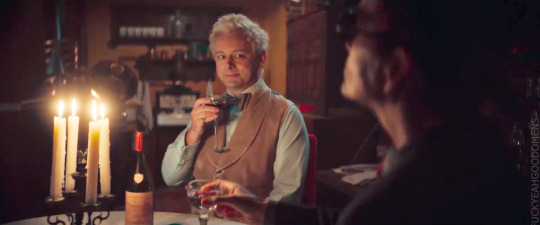
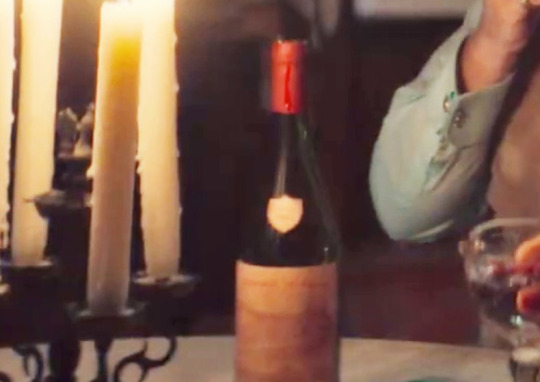
So, in the after-Lift Home scene in 1941 - they seem to be drinking the Châteauneuf-du-Pape. Probably the 1921 year they drink in S1.

So when Aziraphale says: I have several very nice bottles of Châteauneuf-du-Pape in the back. I picked up a dozen cases in 1921, and there's still some left for special occasions.
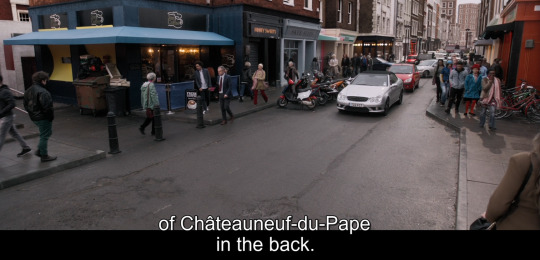
The undertone might be like: Oh remember the last special ocassion when you saved my books and we had candlelit date dinner together?
#good omens#gos2#season 2#Châteauneuf-du-Pape#ep1#1i9#aziraphale's wine#Châteauneuf-du-Pape 1921#1921#ep3#3i9#fun fact#good omens meta#*screams internally*
3K notes
·
View notes